It looks like you're using an Ad Blocker.
Please white-list or disable AboveTopSecret.com in your ad-blocking tool.
Thank you.
Some features of ATS will be disabled while you continue to use an ad-blocker.
share:
Anarchism
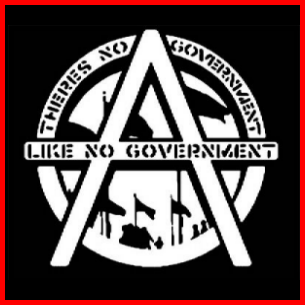
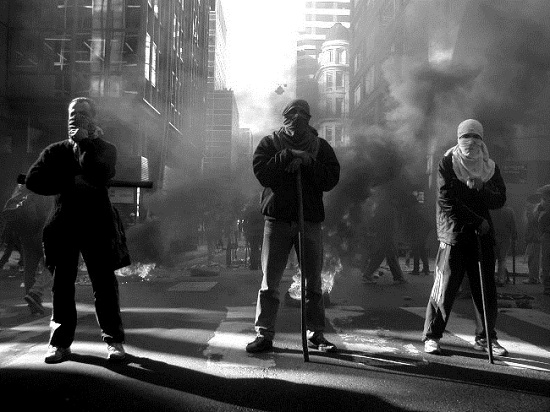
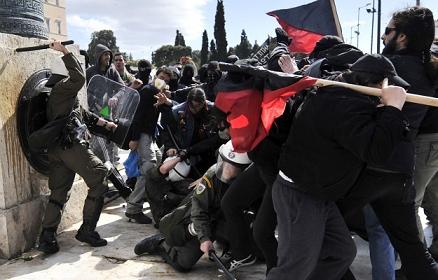
What is anarchism? Unfortunately, there are almost as many answers to that question as there are anarchists themselves, and all definitions depend on who you ask.
Wikipedia (which itself in many ways embodies the best of anarchism) is as a good a place as any to start, I guess:
Another source puts it even more succinctly: “Anarchism is the political belief that society should have no government, laws, police, or other authority, but should be a free association of all its members.”
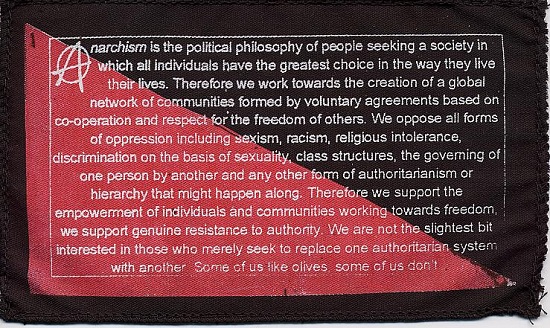
I have been a hard-core dedicated anarchist for almost 7 years now, since I was a young teenager growing up in Europe. I have participated in a number of street actions and sabot actions, in which my physical safety, my legal standing vis-à-vis the state, and my conviction in my beliefs were put repeatedly to the test. I have done things society has punished me for, and I have accepted that punishment as the price I have paid for standing up for my beliefs. However, I want to state clearly that I do not advocate illegal or violent action at all anymore. I believe effective anarchy will come peacefully.
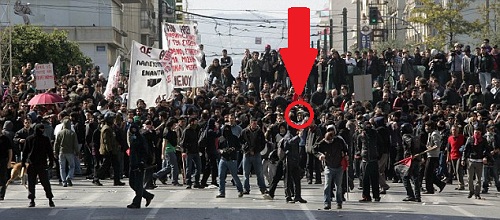
Above: A naïve young girl in Europe who was once most at home in a black bloc.
To kick the thread off, I will organize my first posts as follows.
[color= red]
1. The Big Picture: Anarchism in History
2. The Varieties of the Anarchist Experience
3. Anarchist Symbolism
4. Anarchy Today/Links and Resources

After those posts, I will continue to post in this thread about various sub-topics on anarchism that interest me, from history and theory to news from the ongoing Anarchist actions in Europe and elsewhere.
Also I’d like to thank my boyfriend, ATS member and arch-reactionary Silent Thunder, who is very much not an anarchist, for helping me with the writing and to edit this material, despite his obvious distaste.
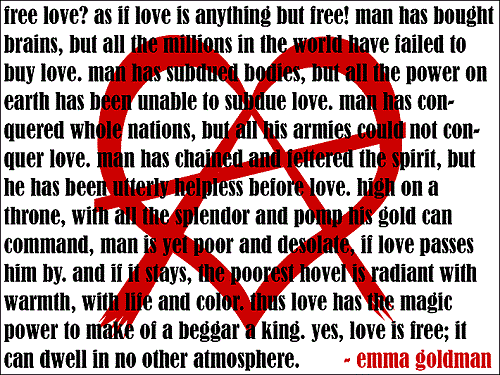
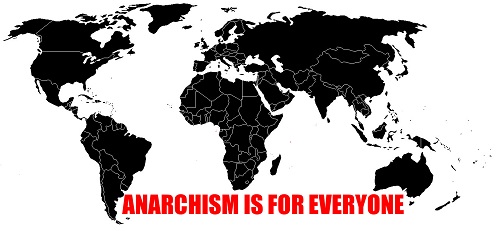




What is anarchism? Unfortunately, there are almost as many answers to that question as there are anarchists themselves, and all definitions depend on who you ask.
Wikipedia (which itself in many ways embodies the best of anarchism) is as a good a place as any to start, I guess:
Anarchism is generally defined as the political philosophy which holds the state to be undesirable, unnecessary, and harmful, or alternatively as opposing authority and hierarchical organization in the conduct of human relations. Proponents of anarchism, known as "anarchists", advocate stateless societies based on non-hierarchical voluntary associations
Another source puts it even more succinctly: “Anarchism is the political belief that society should have no government, laws, police, or other authority, but should be a free association of all its members.”

I have been a hard-core dedicated anarchist for almost 7 years now, since I was a young teenager growing up in Europe. I have participated in a number of street actions and sabot actions, in which my physical safety, my legal standing vis-à-vis the state, and my conviction in my beliefs were put repeatedly to the test. I have done things society has punished me for, and I have accepted that punishment as the price I have paid for standing up for my beliefs. However, I want to state clearly that I do not advocate illegal or violent action at all anymore. I believe effective anarchy will come peacefully.

Above: A naïve young girl in Europe who was once most at home in a black bloc.
To kick the thread off, I will organize my first posts as follows.
[color= red]
1. The Big Picture: Anarchism in History
2. The Varieties of the Anarchist Experience
3. Anarchist Symbolism
4. Anarchy Today/Links and Resources

After those posts, I will continue to post in this thread about various sub-topics on anarchism that interest me, from history and theory to news from the ongoing Anarchist actions in Europe and elsewhere.
Also I’d like to thank my boyfriend, ATS member and arch-reactionary Silent Thunder, who is very much not an anarchist, for helping me with the writing and to edit this material, despite his obvious distaste.



edit on 17-3-2012 by SilentThundersGF because: (no reason given)
Let me tell you this mr thunder....I'm older enough to know better and have never voted.My kids think I'm a nazi but what do they know....Anarchy
can be accomplished only on a minute of understanding.
Anarchism sounds like a great idea on paper, in the same way communism sounds great in theory. I think marx believed anarchism would eventually be
the end product of communism in a perfect world. As we all know we do not live in a perfect world... I realy don't think either system is viable at
all unfortunately 'not because they are bad ideas' but because we lack the maturity as a species to implement them in any meaningful way.
"An anarchist is anyone who believes in less government than you do."
I personally believe there are legitimate uses for human institutions to be used as an expedient.
That being said, I think a lot of "anarchists" are on the right track. The highest goal of all humanity could be realized through the emancipation of all mankind from the arbitrary rule of others. The right to choose and to create for oneself the alternative of choice is the very definition of freedom.
I personally believe there are legitimate uses for human institutions to be used as an expedient.
That being said, I think a lot of "anarchists" are on the right track. The highest goal of all humanity could be realized through the emancipation of all mankind from the arbitrary rule of others. The right to choose and to create for oneself the alternative of choice is the very definition of freedom.
They who know of no purer sources of truth, who have traced up its stream no higher, stand, and wisely stand, by the Bible and the Constitution, and drink at it there with reverence and humility; but they who behold where it comes trickling into this lake or that pool, gird up their loins once more, and continue their pilgrimage toward its fountain-head.
I heartily accept the motto, "That government is best which governs least"; and I should like to see it acted up to more rapidly and systematically. Carried out, it finally amounts to this, which I also believe--"that government is best which governs not at all"; and when men are prepared for it, that is the kind of government which they will have. -Henry David Thoreau, Concord Lyceum lecture, 1848, Civil Disobedience, 1849
edit on 17-3-2012 by METACOMET because: thoreau
“Anarchism is the political belief that society should have no government, laws, police, or other authority, but should be a free association of all its members.”
I think that government should definitely have a limited role in our lives, but the idea of having no government at all is just ridiculous and incredibly stupid in my opinion. Almost as ridiculous as believing that we should not have police... The world would be swarming with chaos if we didn't have a set of rules/guidelines to follow. Look at the crime rate statistics that we have now WITH a legal system and police to enforce laws. Imagine how crazy things would get if we didn't have any sort of legal structure and people could just do as they pleased. Again, I think government definitely needs to be reshaped, but anarchism is far from the answer. Go be a hunter gatherer in some wooded area if you really want a taste of the "anarchism" you defined above.
I have been watching this forum for a while now but never felt I needed to join UNTIL I saw your thread here... It made me want to post a comment to
understand fully your motives. You say 'I do not advocate illegal or violent action' and 'I am an anarchist but I ADVOCATE PEACEFUL ACTION ONLY'
but you show a picture of yourself ( I presume its you) with a machine gun... Too many 'anarchists' get drawn into this gun-weilding revolutionary
mindset. By all means talk about the wonderful possibilites anarchy could offer but don't destroy your own post with stupid hypocritical photo's.
You do yourself no justice.
I think the reason why Anarchism doesn't exist is because there are too many people that think they know how you should live your life.
Motto of government: "Live this way, or else..."
Motto of government: "Live this way, or else..."
I'll make it simple for you...
"Anarchism is stateless socialism", Mikhail Bakunin.
Stateless Socialism: Anarchism
People focus on Anarchism being anti-government, but in reality it was more about anti-capitalism. It originated from Proudhon...
eng.anarchopedia.org...
"Anarchism is stateless socialism", Mikhail Bakunin.
Stateless Socialism: Anarchism
People focus on Anarchism being anti-government, but in reality it was more about anti-capitalism. It originated from Proudhon...
Pierre-Joseph Proudhon (pronounced [ˈpruːd ɒn] in BrE, [pʁu dɔ̃] in French) (15 January, 1809 – 19 January, 1865) was a French economist and socialist philosopher who was the first individual to call himself an "anarchist" and is considered among the first anarchist thinkers. Proudhon is most famous for his assertion of "Property is theft!", in his missive What is Property? Or, an Inquiry into the Principle of Right of Government with the original title: Qu'est-ce que la propriété? Recherche sur le principe du droit et du gouvernement, which was his first major work, published in 1840...
...In his earliest works, Proudhon analyzed the nature and problems of the capitalist economy. While deeply critical of capitalism, he also objected to contemporary socialists who idolized association. In series of commentaries, from What is Property? (1840) through the posthumously-published Théorie de la propriété (Theory of Property, 1863-64), he declared that "property is theft", "property is impossible", "property is despotism" and "property is freedom". The apparent contradiction is resolved when it is realized that, in "property is theft", he was using the word to mean the type of property which created exploitative conditions. Specifically, he was referring to the means of production which labourers did not own themselves, and the system of wage labour...
...On the other hand, in asserting that property is essential for liberty, he was referring not only to the product of an individual's labor, but to the peasant or artisans home and tools of his trade. For Proudhon, the only legitimate source of property is labor. What one produces is his property and anything beyond that is not. He can be considered a libertarian socialist, since he advocated worker self-management and argued against capitalist ownership of the means of production.
eng.anarchopedia.org...
edit on 3/17/2012 by ANOK because: It's a commie takeover Harry
reply to post by ANOK
I've always thought of Anarchism as anti-control, myself.
Originally posted by ANOK
People focus on Anarchism being anti-government, but in reality it was more about anti-capitalism.
I've always thought of Anarchism as anti-control, myself.
edit on 17-3-2012 by Sci-Fi_entist because: (no reason given)
Originally posted by RichieRay
Look at the crime rate statistics that we have now WITH a legal system and police to enforce laws. Imagine how crazy things would get if we didn't have any sort of legal structure and people could just do as they pleased.
Look at history. It is the story of how governments have squandered the blood and treasure of the human race.
I just find it puzzling when you bring up crime statistics when it is a fact that six times as many people died at the hand of their own governments during the 20th century than in all that century's wars combined. Government is not making you safer in any sense of the word.
Concentrated political power is the most dangerous political construct, not anarchy.
Maybe there is a happy medium, but that depends on how much blackmail that entity will charge to just leave you alone.
edit on 17-3-2012 by
METACOMET because: (no reason given)
Originally posted by RichieRay
Look at the crime rate statistics that we have now WITH a legal system and police to enforce laws. Imagine how crazy things would get if we didn't have any sort of legal structure and people could just do as they pleased. Again, I think government definitely needs to be reshaped, but anarchism is far from the answer. Go be a hunter gatherer in some wooded area if you really want a taste of the "anarchism" you defined above.
I think it's interesting to note that, even though there hasn't ever really been a large-scale anarchist society on this planet ( I can't actually think of even a small scale one either), this argument ALWAYS gets used as a rebuttal. But there's never been any evidence to suggest that the world would be any worse off than some of the insanity that is occurring in some countries now.
I like how you quoted one part of my post, and failed to read the rest of it apparently. I did not quote any statistics because I'm not interested in
them to be honest, but common sense tells me that if we did not have some sort of structure then we would not have come this far and would probably
have gone extinct by now. Again I realize that the government is in DESPERATE need of a major CHANGE, my main focus was to get my point across that
having no government or police is quite possibly the stupidest thing I've heard all day. If I even need to explain this then I think you too should
join the "anarchists" and go live in a secluded portion of land where you can have the free roam you desire in a lawless community. I would love to
check up on you in 10 years and see how far your lawless euphoria has come along.
Originally posted by Sci-Fi_entist
reply to post by ANOK
I've always thought of Anarchism as anti-control, myself.
Well a system can not be just anti, it has to have an answer to what it is against.
Anarchism was not just anti, it had an answer to the problem, workers democratic control of the means of production preserving the maximum personal liberty possible. Just like socialism there is more than one way to implement it, from libertarian socialism to anarcho-sindicalism (socialism though worker controlled trade unions), anarcho-collectivism (communism).
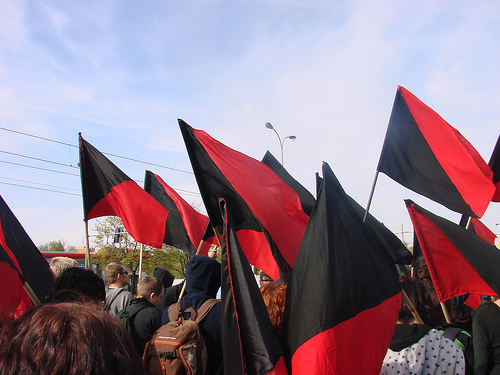
The Big Picture:
Anarchism in History
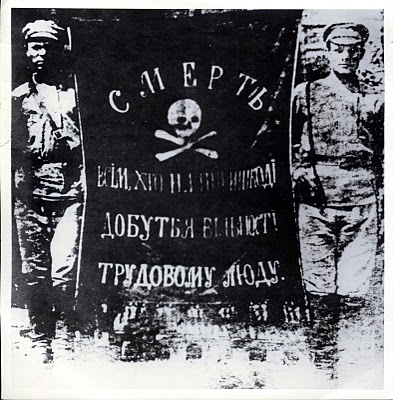
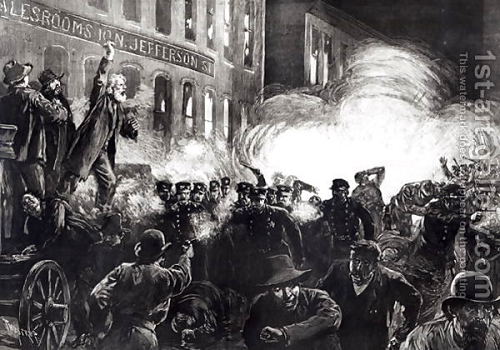
There are many historical phenomena that resemble anarchism in part or whole and arose long before the first formalizations of “capital-A-anarchism” in the 19th century. Examples include slave revolts of the ancient world, the peasant risings of medieval Europe, the aims of the Diggers in the English Revolution of the 1640s, the revolutions in France in 1789 and 1848, and the Paris Commune of 1871. Some point to ancient Chinese Taoists like Chuang Tsu as the first people to articulate a coherent anarchy-like philosophy.
These aside, however, people usually speak of the historical development of anarchy in terms of the four major classical anarchist thinkers: William Goodwin, Pierre-Joseph Proudhon, Mikhail Bakunin, and Peter Kropotkin. There are also other important anarchist theorists, including those who developed anarchist philosophy in a non-western context. Examples of these latter include Vinoba Bhave in India, Kotuku Shusui in Japan, and Mbah and Igarewey in Africa.
We will look at the “big four” thinkers above more closely in my next post.
Real Action
The ideas of the thinkers noted above have been very influential, but they remain just that: ideas. One criticism of Anarchism is that it promises much but delivers little. Not true! Anarchism has a number of historical achievements. Examples include the following:
- The English Civil War, the French Revolultion, and even the American revolution all had their recognizably anarchic elements.
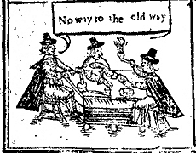
- In Mexico, Ricardo Flores Magon and his brothers published an anarcho-syndicalist newspaper Regeneracion, starting in 1900. Magnon was of
importance in the struggle to oust Mexican dictator Porfirio Diaz, and was influential on his fellow peasant revolutionary, Emiliano Zapata. Today’s
EZLN (Zapatista Army of National Liberation) is “loosely inspired” by Zapata and Magnon’s ideas and actions.
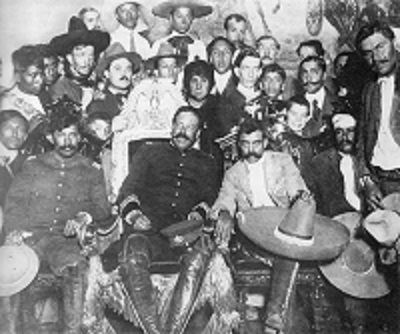
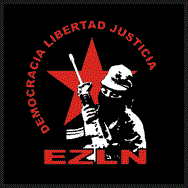
- In the United States, Anarchist Leon Czolgosz assassinated President William McKinley in 1901. Around that time, Europe and America were rocked by
a spate of anarchist bombings and assassinations.
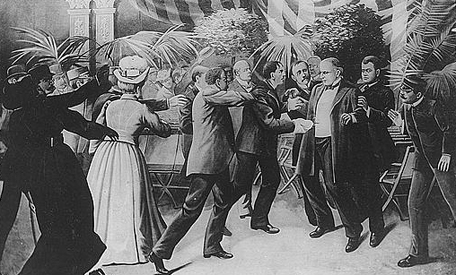
- In the Russian Revolution, anarchists were enormously important early on, as can be seen in incidents like the Kronstadt rebellion. Anarchists
fought in the Russian Civil War, sometimes with the communists, and sometimes against. Anarchists made great headway establishing collectives in the
Ukraine on an anarchist model before being smashed by the increasingly statist and authoritarian communists.
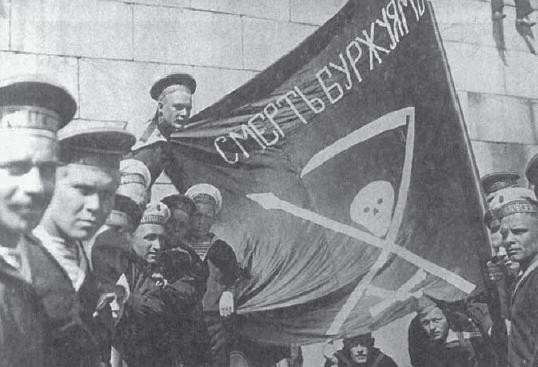
- In the Spanish Civil War, the CNT played a huge role as an anarchist force and managed to put many anarchist principles into action in the
territory they held. Note the anarchist flag on the CNT/FAI streetcar below, for example.

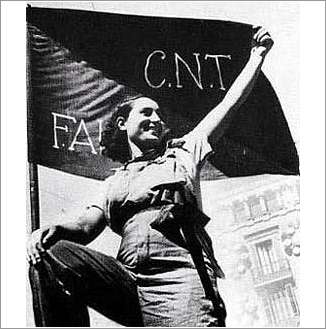
- Today, anarchists are playing increasing roles across the world, whether in the still-unfolding global protests or online, asserting freedom of
information. It is no exaggeration to say anarchism is now more robust than ever before in history. We may even be entering a “golden age of
anarchism,” as states everywhere break down under the strain of their internal contradictions.
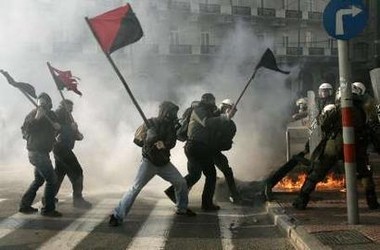
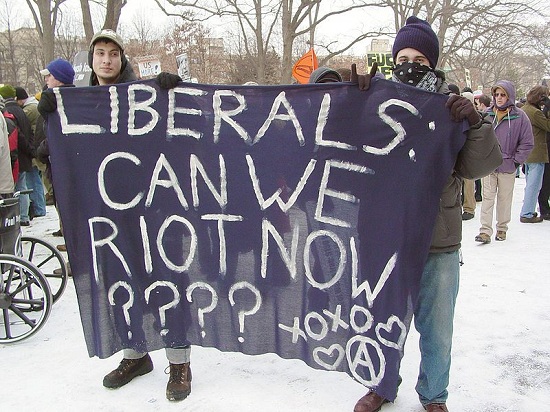


In my next post, we will look at the four major theorists who created the philosophical basis of classical anarchism.
edit on 17-3-2012 by SilentThundersGF because: (no reason given)
reply to post by METACOMET
you're right, if we didn't have police then everyone would be much safer.... our government (as crappy as it is) is way worse than free roaming murderers and rapists, we would be much safer without jails or police or laws.... not all laws are bad
www.youtube.com...
you're right, if we didn't have police then everyone would be much safer.... our government (as crappy as it is) is way worse than free roaming murderers and rapists, we would be much safer without jails or police or laws.... not all laws are bad
www.youtube.com...
reply to post by Sci-Fi_entist
There is no evidence of anarchism working/not working because the idea of it isn't very well thought out, so no wonder it's never been given a shot. If the whole world switched to an anarchist state tomorrow, do you expect people to just cooperate and switch over? Someone would need to enforce it because there would be mass rioting immediately after all laws and forms of government are removed. If a society is lawless, then I'm assuming that means murderers and the most evil of criminals also would be able to partake in the free reign. Earth and all of its inhabitants will never have free roam to just do as they please. They never have, and they never will.
There is no evidence of anarchism working/not working because the idea of it isn't very well thought out, so no wonder it's never been given a shot. If the whole world switched to an anarchist state tomorrow, do you expect people to just cooperate and switch over? Someone would need to enforce it because there would be mass rioting immediately after all laws and forms of government are removed. If a society is lawless, then I'm assuming that means murderers and the most evil of criminals also would be able to partake in the free reign. Earth and all of its inhabitants will never have free roam to just do as they please. They never have, and they never will.
At least Anarchists are more honest egalitarians than their Liberal, Socialist, and Communist counterparts. But with that said, I find Anarchism as a
political philosophy to be one of the constant threats to civilized society which has been infecting the minds of people for time immemorial. There
has always existed, shall always exist, and rightfully exists authoritative hierarchies upon which we must humble ourselves in obedience. This is not
to assert however that there has never existed a political authority worthy of condemnation.
Civilized society comes about first through authority which often does not arise by consent as Rousseau and Hobbes would hope for. It arises out of necessity. When people are free they become savages, unable to control their most primitive of instincts. Always this leads to disaster, social decay, and mass violence. Those who think otherwise need to admit they are nothing more than utopian dreamers, living in an unrealistic fantasy land.
As the necessity of authority arises, a hierarchy develops, usually through force of arms. The arising socio-political elite are typically well trained and armed soldiers of some sort. They have the unsavory job of civilizing the primitives who do not take kindly to being ordered around. The typical obnoxious rebellious attitude of ‘who do you think you are to tell me what to do?’ arises as the barbarians assert their hedonistic, animal like individualism as supreme.
At the same time however the more sane members of that geographic area or ethnic group accept the necessity of authority and submit. Those who refuse are slaughtered into submission for the greater good. All of this has happened repetitively throughout history. It was quashed for centuries until the naturalists arose seeking to defy established order by proclaiming the necessary contractual arrangement between peasant and King.
Thinkers such as Hobbes assumed that by allotting power to the state through consent, sacrificing primitive freedoms for security would both break ‘tyrannical’ authority and prevent the war of all against all. His more individualistic and liberal counterparts however felt that we need not a Leviathan. Man was capable of maximized freedom without causing a war of all against all – such a naïve assumption.
Nevertheless, Anarchism cannot work nor will it ever be permitted to take hold anywhere save the most primitive of places. Those who assume the maximization of individual liberty, especially in the form of Anarchism, is more civilized are quite humorous.
Civilized society comes about first through authority which often does not arise by consent as Rousseau and Hobbes would hope for. It arises out of necessity. When people are free they become savages, unable to control their most primitive of instincts. Always this leads to disaster, social decay, and mass violence. Those who think otherwise need to admit they are nothing more than utopian dreamers, living in an unrealistic fantasy land.
As the necessity of authority arises, a hierarchy develops, usually through force of arms. The arising socio-political elite are typically well trained and armed soldiers of some sort. They have the unsavory job of civilizing the primitives who do not take kindly to being ordered around. The typical obnoxious rebellious attitude of ‘who do you think you are to tell me what to do?’ arises as the barbarians assert their hedonistic, animal like individualism as supreme.
At the same time however the more sane members of that geographic area or ethnic group accept the necessity of authority and submit. Those who refuse are slaughtered into submission for the greater good. All of this has happened repetitively throughout history. It was quashed for centuries until the naturalists arose seeking to defy established order by proclaiming the necessary contractual arrangement between peasant and King.
Thinkers such as Hobbes assumed that by allotting power to the state through consent, sacrificing primitive freedoms for security would both break ‘tyrannical’ authority and prevent the war of all against all. His more individualistic and liberal counterparts however felt that we need not a Leviathan. Man was capable of maximized freedom without causing a war of all against all – such a naïve assumption.
Nevertheless, Anarchism cannot work nor will it ever be permitted to take hold anywhere save the most primitive of places. Those who assume the maximization of individual liberty, especially in the form of Anarchism, is more civilized are quite humorous.
Now I understand why you and your boyfriend get along - You are both insane, dangerous gun nuts who seem to delight in taking crazy physical risks.
Just joking. Sort of. I hope what you said about being all mellowed out in your old age is true. You are also both smart so I'll be looking forward
to the rest of this.
Anyway, to get more on topic, it is an interesting topic, I've tried to read about anarchist theory before but always thrown up my hands in dispair because its all so compelx with all these sub-flavors. I'm guessing you will try to untangle that for us, or if that wasn't your plan, that'd be my request. Also, I want to think about how libertarianism and anarchy are different, it makes my head ache sometimes trying to figure it out. Thanks in advance, interesting thread.
Anyway, to get more on topic, it is an interesting topic, I've tried to read about anarchist theory before but always thrown up my hands in dispair because its all so compelx with all these sub-flavors. I'm guessing you will try to untangle that for us, or if that wasn't your plan, that'd be my request. Also, I want to think about how libertarianism and anarchy are different, it makes my head ache sometimes trying to figure it out. Thanks in advance, interesting thread.
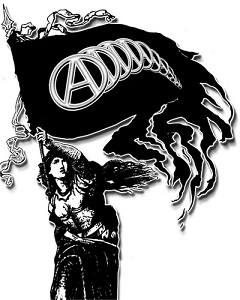
“The Big Four”
Anarchist Theorists
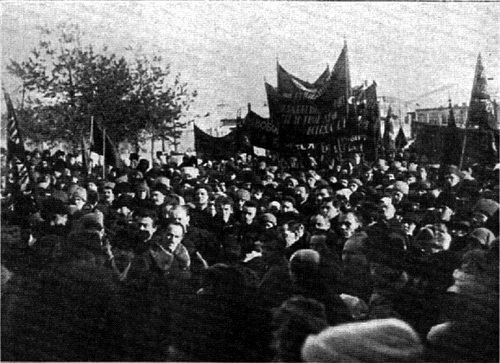
As noted above, the theoretical backbone for classical anarchist theory comes from four main thinkers.
William Goodwin (1756–1836)
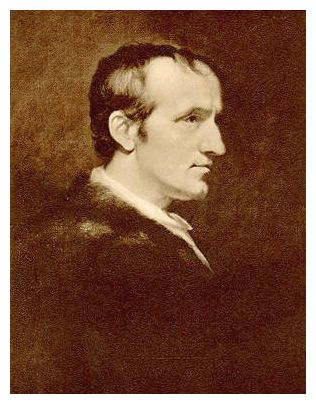
In 1793, he spoke out against state authority, legal authority, and economic control of private property in his Enquiry Concerning Political Justice. The prevailing intellectual circles of the day were hostile to this radical work, and it was forgotten by the mainstream, although it circulated underground for decades, read and admired by various types of radicals. Also, it should be noted that William Goodwin was the father of Mary Shelly, author of Frankenstein. Make of that what you will.
Pierre-Joseph Proudhon (1809–65)
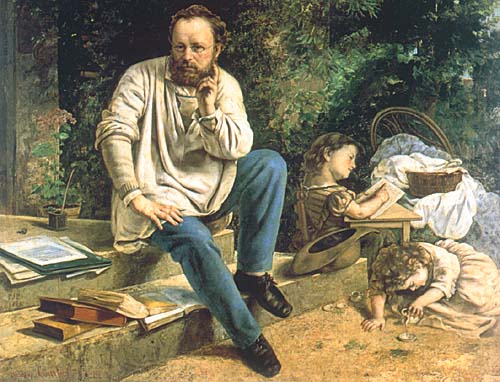
Proudhon was the first person to proudly call himself an “anarchist.” The word had been in use before, but as a derogatory or negative term. He was the originator of the early anarchist slogan, “Property is Theft.” He did believe families had a right to their own property, however. His vision of anarchy was based on the idea of a successful federation of small local communities, perhaps like the Swiss model of the cantons. He has been criticized for having a romantic or unrealistic idealism of rural community life, but his vision of loosely-federated, autonomous local communities of ruralists and artisans continues to be appealing to anarchists.
Mikhail Bakunin (1814–76)
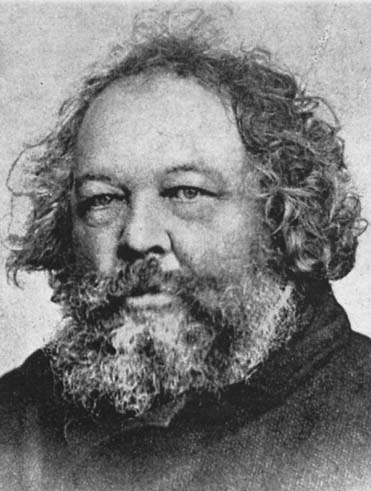
Bakunin earned fame for his role as a leading figure of anarchism in the Russian revlolution. His arguments with Marx in the 1870s were important for both communist and anarchist theorists. Bakunin’s greatest achievement was predicting – with eerie accuracy – exactly how communisim would turn into authoritarianism, as with Mao and Stalin, and eventually lose its way. “Freedom without socialism is privilege and injustice, but socialism without freedom is slavery and brutality,” he said.
Peter Kropotkin (1842–1921)
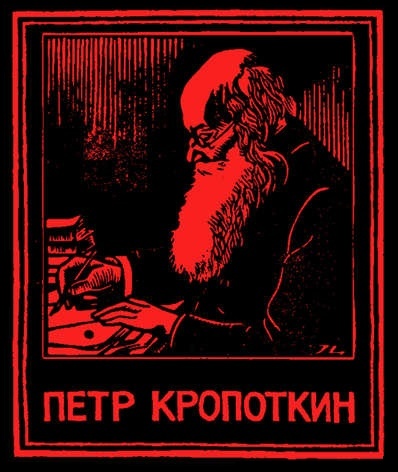
Originally a geographer, he made his name as a theorist with The Conquest of Bread , his 1892 book on how a post-revolutionary society might be able to organize itself from the bottom up rather than top-down through government. He was a fan of Darwinism, but in contrast to the right-wing Social Darwinists, he interpreted evolution with an emphasis on the cooperative and mutualist aspects. Life is not only competition: cells organize to make tissues, tissues make organs, and organs cooperate to make beings. His 1899 book Fields, Factories and Workshops was about how to make work more humane. One example: blend agriculture and industry, paperwork and physical work, so that people get a chance to use their whole beings in a balanced way. His idea of mutual aid is an inspiring example of the possibilities of organic, non-violent anarchy, simply through people helping each other.
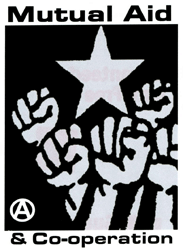
Next, we will look at the sub-varieties of anarchism, and how they fit together (or don’t). I guess I’ll try to answer some points posters have made one of these times.
edit on 17-3-2012 by SilentThundersGF because: (no reason given)
reply to post by SilentThundersGF
And the oft overlooked Christian Anarchist,
And the oft overlooked Christian Anarchist,
Only two issues present themselves, and both are closed. One is to destroy violence by violence, by terrorism, dynamite bombs and daggers as our Nihilists and Anarchists have attempted to do, to destroy this conspiracy of Governments against nations, from without; the other is to come to an agreement with the Government, making concessions to it, participating in it, in order gradually to disentangle the net which is binding the people, and to set them free. Both these issues are closed. Dynamite and the dagger, as experience has already shown, only cause reaction, and destroy the most valuable power, the only one at our command, that of public opinion.
The other issue is closed, because Governments have already learnt how far they may allow the participation of men wishing to reform them. They admit only that which does not infringe, which is non-essential; and they are very sensitive concerning things harmful to them — sensitive because the matter concerns their own existence
theanarchistlibrary.org...
edit on 17/3/2012 by teapot because: ooops
new topics
-
UK Borders are NOT Secure!
Social Issues and Civil Unrest: 1 hours ago -
Former ‘GMA Producer’ Sues NPR-Legacy Media Exposed
Propaganda Mill: 3 hours ago -
New Footage - Randy Rhoads 1979 LIVE Guitar Solo Footage at the Whisky - Pro Shot
Music: 3 hours ago -
Happy Hanukkah…
General Chit Chat: 3 hours ago -
A Merry Christmas.
General Chit Chat: 11 hours ago
top topics
-
Former ‘GMA Producer’ Sues NPR-Legacy Media Exposed
Propaganda Mill: 3 hours ago, 8 flags -
A Merry Christmas.
General Chit Chat: 11 hours ago, 7 flags -
Happy Hanukkah…
General Chit Chat: 3 hours ago, 6 flags -
New Footage - Randy Rhoads 1979 LIVE Guitar Solo Footage at the Whisky - Pro Shot
Music: 3 hours ago, 3 flags -
UK Borders are NOT Secure!
Social Issues and Civil Unrest: 1 hours ago, 2 flags
active topics
-
UK Borders are NOT Secure!
Social Issues and Civil Unrest • 5 • : gortex -
Plane Crash Today --Azerbaijanian E190 passenger jet
Mainstream News • 34 • : WeMustCare -
Happy Hanukkah…
General Chit Chat • 12 • : JJproductions -
-@TH3WH17ERABB17- -Q- ---TIME TO SHOW THE WORLD--- -Part- --44--
Dissecting Disinformation • 3817 • : Thoughtful3 -
Petition Calling for General Election at 564,016 and rising Fast
Political Issues • 170 • : angelchemuel -
Trump says ownership of Greenland 'is an absolute necessity'
Other Current Events • 50 • : matafuchs -
Former ‘GMA Producer’ Sues NPR-Legacy Media Exposed
Propaganda Mill • 4 • : MuddyPaws2 -
Orange County Makes Shoplifting a Felony
Other Current Events • 27 • : Degradation33 -
JILL BIDEN Wants JOE to Punish Democrats Who Forced Him to Leave Office in Disgrace on 1.20.2025.
2024 Elections • 16 • : Guyfriday -
Cold Blooded Killers on Christmas!! GRRRRrrr!!
Pets • 12 • : bluesman023
